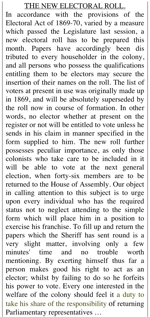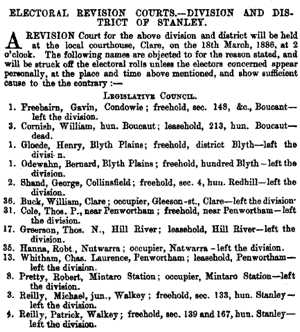You
are receiving this because your address is subscribed at: www.jaunay.com/newsletter.html |
|
 |
| No: 81 |
November 2012
|
|
News November seminars 11: Coming to grips with the new FamilySearch, WEA Centre Adelaide 10:00am to 1:000pm December seminars There are no seminars planned for December. See the seminar program for more details and bookings. SA Genealogy & Heraldry Society The Annual General Meeting of the Society was held on 24 Oct at 201 Unley Road Unley. Like all Australian capital city family history societies, SAGHS is having to come to terms with declining membership. This is a pity as the Society has much to offer all South Australians interested in their ancestry. Family History Book Award A proud history: a history of the Foord family by Graham Jaunay was awarded equal first prize for the best family history published in South Australia in 2011 by the SA Genealogy & Heraldry Society. Although he has written numerous books, this was only the second time a book had been submitted for judging. On the previous occasion in 1989, A toast to the future: the story of George Johnson and his family also won first prize. Electoral records in South Australia The Legislative Council, the first parliament in South Australia was created in 1840. It was originally appointed by the Governor, and only served in an advisory capacity, as the governor retained almost all legislative powers. In 1856, the Legislative Council prepared the 1857 Constitution of South Australia that outlined self-government and created a bicameral system, which involved delegating most of the legislative powers to the new House of Assembly. While all adult males could vote in the House of Assembly, the Legislative Council continued to limit voting rights to the wealthier classes. In 1894, the House of Assembly granted South Australian women the right to vote. |
In
this issue: |
|
Adelaide
Proformat Services
|
 Electoral Rolls provide an accessible and valuable basis for family history research. Unfortunately, in South Australia, before Federation in 1901, this record is incomplete for two reasons. First, it was not compulsory to register with the Electoral Office. The record of voters, therefore, only contains those who, for whatever reasons, registered to vote. Until 1895–1896 it only contained the names of male voters over the age of 21 years. Secondly, it is believed that most of the rolls from the nineteenth century were destroyed in a fire. Those known to still exist were microfilmed by the Electoral Office and provided to a number of other institutions. Electoral Rolls provide an accessible and valuable basis for family history research. Unfortunately, in South Australia, before Federation in 1901, this record is incomplete for two reasons. First, it was not compulsory to register with the Electoral Office. The record of voters, therefore, only contains those who, for whatever reasons, registered to vote. Until 1895–1896 it only contained the names of male voters over the age of 21 years. Secondly, it is believed that most of the rolls from the nineteenth century were destroyed in a fire. Those known to still exist were microfilmed by the Electoral Office and provided to a number of other institutions.An understanding of the process may assist the researcher. From 1857 to 1884 an electoral roll was created for each new election. These rolls were displayed in prominent places within the electorate where the election was being conducted. Few have survived. Pictured: Register Newspaper 24 Jan 1874 p5 outlines the process in place for potential electors to register for the forthcoming poll. From 1887 permanent rolls were maintained although again not all have survived. The following table outlines the progression towards universal suffrage in South Australia.
In South Australia, women have had the right to vote in state elections since 1894 and federal elections since 1902. Recently, some other pre-1900 State Rolls have been located in the State Archives. Those from 1853 are hand written but have now been typed and made available for public use. Others are original typed copies and may be seen at SA State Records (copies for some of this material can be seen at the State Library and SA Genealogy & Heraldry Society). They include: • House of Assembly—1874–1880 Albert District only; 1884; 1887–1891; 1909; 1912–1913 Arranged by electoral district (coverage incomplete). • Legislative Council—1869–1890 with gaps Victoria District only; 1874–1880 Albert District only; 1884–1885; 1887–1891; 1909; 1912–1913 Arranged by electoral district (coverage incomplete). The State Library of SA collection also holds 1862 (Mt Barker) and 1874 (Wooroora). Other rolls are in less obvious locations and not always located by a subject search. For example the 1878 roll for places on Yorke Peninsula may be see in the book, Alan Phillips: Yorke Peninsula records Vol 1, 1989. The 1853 Electoral Rolls for Burra, Light & Eyre, Mt Barker, Noarlunga and Stanley districts can be found at State Records in Series GRG24/6: Correspondence received by the Chief Secretary's Office.  South Australian electoral rolls from 1905 are available for public access, on microfilm, at the Adelaide office of the National Archives of Australia in Leigh Street and the State Library on North Terrace. Search the State Library catalogue with the subject: Voting registers -- South Australia. While not Electoral Rolls per se, the Government Gazette notices of the Electoral Revision Courts name individuals and their addresses scheduled to be struck off the roll due to change of address. For a fuller treatment on this material, it is recommended that the reader access, Tony Bott: South Australian electoral rolls 1852–1904: a user's guide, 1999 as this lists all such entries by electoral district in the gazettes 1879–1904. Pictured: SA Govt Gazette 25 Feb 1886 p395 The State Electoral Office is located at Level 6, 60 Light Square, Adelaide. |
|||||||||||||||||||||||||||||||||||||||||||
| To
unsubscribe send a blank email via the following link using the same
address you subscribed to: newsletter-leave@jaunay.com |
|||||||||||||||||||||||||||||||||||||||||||